As online learning continues to grow, it is important to investigate student’s overall experiences in online learning environments. Understanding student’s perspectives on their online classes or programs, moves beyond the sole question of student satisfaction, to more nuanced questions about how factors inside and outside of the classroom impact the learning process. This qualitative research synthesis explored student’s experiences with online learning.
Keywords: Online learning, Students, Online classes
The growth of online learning during the last decade has been remarkable. While in 1998 there were too few students enrolled online to count, according to a survey of more than 2500 intuitions, by 2009 more than 5.6 million students were taking an online course. The same study also found percent of enrollment growth was 21%, while overall growth in higher education was only 2%. Moreover, the 21% growth rate for online enrollments far exceeds the less than 2% growth of the overall higher education student population. These numbers indicate that online learning has become an important mode of delivering instruction in higher education. Although the numbers of students taking online courses are growing. By comparing students that studied online to other students that had the courses on the traditional way, they tend to be relatively similar when comparing race, gender, socioeconomic status, and physical distance from the institution. Students who take online courses tend to be slightly older than those students taking all courses offline. Several important studies have documented that these students have good learning outcomes in online courses. Student evaluation is an essential component in feedback processes in faculty and learner development.
Due to war on the territory of Ukraine the universities changed the way of education to a synchronous online learning, including medical universities. Students of last years of studies in different medical faculties having practical classes had different proposals and complains for this way of study and different universities are trying to find solutions for this current situation.
We believe that feedback for teachers needs to be a two-way process, similar to feedback for students, for it to be effective. An online feedback form has been sent with fourth, fifth and last year medical students from Kharkiv medical university to promote open discussion between teachers and students. The feedback form is accessible for students throughout google form and shared to their university mail.
We aim to explore the benefits and challenges of this online feedback tool and assess its value.
Qualitative data was obtained from last 3 year medical students of Kharkiv national medical university and Clinical Teaching Fellows using a questionnaire. Data was analyzed to provide a reel feedback of the students in an analytical theme. The questionnaire was made of some direct questions with multiple choices and some others indirect were the students have possibility to right their opinions or complains, and shared between 17/10/2022 and 21/10/2022 Table 1.
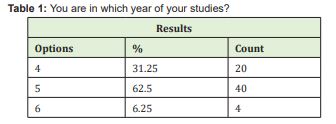
The student was asked to note his/her year of study and the degree, general opinion about online studying, what type of study does he/she prefers, if the online course meet their expectations in terms of quality of learning and if it is helpful in progressing toward the degree or goals, recommendation and rating. Then opinions that they wish to add, anything they wish to learn in the online course but not present and the problems that they face if present.
After sharing the form, 64 students from different medical faculties of Kharkiv National Medical University filled the form. Among this students 40 students are studying general medicine and 24 students are studying dentistry. They are on last years of their studies with the majority of them are in 5th course Figure 1.
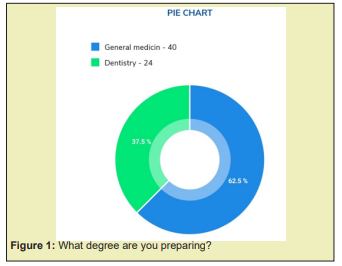
The majority with 62,5% find that online studying is useful in general, and 37% thinks that studies online isn’t useful. As medical students, 35(54%) prefer to study in a mixed way with 20 (31%) that thinks that offline (on campus) is the best way for study and only 9 (14%) prefer to continue online studies Figure 2.
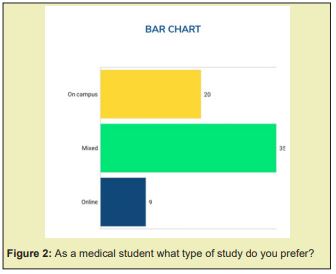
By asking them if the online course met their expectations in terms of quality learning, 53% voted for yes. And 58% find that the online course is helpful in a manner to progress toward their degree or goals. 54% of the students that filled the form, wouldn’t recommend online course for other medical students while 45% do Figure 3.
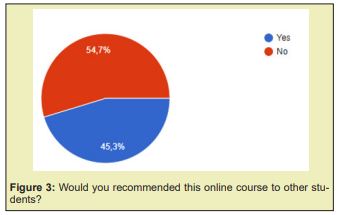
By asking them an optional question about the improvements that they would make to this online course, 34 students wrote their opinion. Mostly more than half thin that practice or clinical studies should be done in a manner, so some suggest adding extra clinical cases to the course while others don’t have idea about the way. Having offline classes was clearly present between the answers of improvement of the way of study, while some complains about the way of learning such as short classes, absence of the seriousity from both sides teachers and students leading to low quality, late sending invitations, and absence of clinical cases leading to a theoretical study result only.
Then 25 students answered the question about what they wish to learn in the online course and wasn’t present. The majority of the answers were about practical skills again, and some ideas about interaction in a manner with presentation of different clinical cases.
It was remarkable that 79% of the answers came positive for the question about finding the online course fitting into their weekly schedule easily. In the other side the results for rating the online course’s experience with Kharkiv National Medical University during the war, shows 37% Good experience, 35% Acceptable, 14% very good and 12 low level Figure 4.
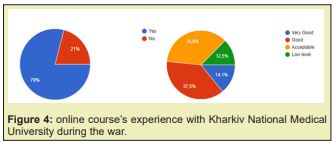
Last question was about the problems that students are facing during the online studies. For this question 80% are not facing any special problem during attending classes, in contrast some complains were noted and we differentiate: time difference in some countries, low internet connection in some other countries, Moodle platform language for international students, complains about some teachers, and the absence of the practical training.1,2
The current situation isn’t easy and not only students and teachers are affected we have a country that is affected from many sides, for this reason complaining will not be the correct solution, and the only thing possible is to improve the distance learning as possible.
The results show that the students are grieving with the current situation, as well it’s clear that the university is trying the best to give a good experience and teaching method to the students.
Among the 64 students that took the survey, 62% find that online learning technology is useful in a manner, while 54% prefer a mixed type of study and complains missing of the clinical practice part which is important, and this way of study meet the expectation of 53%, while 58% find that it is helpful progressing toward their degree. What was really attractive that the majority with 53% don’t recommend this way of study to other medical students, what means that maybe they accept that due to the situation but they don’t confirm this way of study better than the offline one.
Going back to the complains of a big part about the absence of the practical part during their last years of study and having only theoretical, the university should find a way to improve that either by asking students to join the nearest hospitals to make some practice, either by developing some online platform for giving some clinical cases and try as much as possible to deliver practical skills to the students Figure 5.1,2
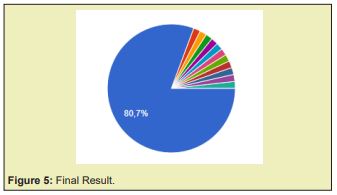
As a conclusion the students shows a partial satisfaction for the online study, with some complains that should be taken in consideration by the responsible. Maybe making some frequent questionnaires, to ask students about recent complains and schedule to solve and improve this way of study in different departments leading to a better experience.
None.
None.
Authors declare that there is no conflict of interest.
- 1. Blackmon SJ, Major C. Student experiences in online courses: a qualitative research synthesis. Quarterly Review of Distance Education. 2012.
- 2. Almoghrabi B, Nesterenko V. Qualitative data calculated by a google form with questionnaire. Among Kharkiv national medical University. 2022.

